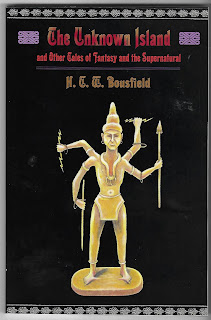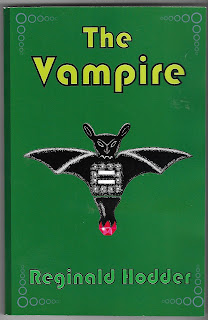
In one of Michael Innes’ very enjoyable detective novels he
has a character who is, like him, the author of fairly popular thrillers and she
feels rather the ill-concealed disdain for her work by fellow-writers who have
more literary aspirations (though fewer readers).
I have not to hand the
exact quotation, but there is a passage where we may suppose Innes was speaking
on behalf of his own books too when his character says, in effect, that good
yarns do have their merit, particularly as a solace for people in tricky times
or as a pleasing diversion from hard realities, and so on. It is these books
readers turn to when they need reading most, she avers.
I was reflecting on this, and thinking the other day which
‘yarns’ have given me the most pleasure so that I look back upon them, and
indeed re-read them, with fondness. I then tried to come up quickly with as
frank a list I could of such titles. Not the ones I thought I ought to include,
not necessarily ones that mark particular points in my life, but those that I
read, and still read, with the most enthusiasm and delight.
I have of course done various versions of this list, which changes
almost every time I look at it, but here it is just now:
The Man Who Was Thursday – G K
Chesterton (1908)
Undergrowth – Francis &
Eric Brett Young (1913)
The Thirty Nine Steps – John
Buchan (1915)
The Rector of Maliseet –
Leslie Reid (1925)
Cups Wands Swords – Helen
Simpson (1927)
Armed With Madness – Mary
Butts (1928)
War in Heaven – Charles Williams
(1930)
Look to the Lady – Margery
Allingham (1931)
The Place of the Lion –
Charles Williams (1931)
Sweet Danger – Margery
Allingham (1933)
The Nine Tailors – Dorothy L
Sayers (1934)
Old King Cole – Edward Shanks
(1936)
The Dark Frontier – Eric
Ambler (1936)
Picture of Nobody – Philip Owens
(1936)
The Secret Vanguard – Michael Innes
(1940)
The Devil in Crystal – Louis
Marlow (1944)
Appleby’s End – Michael Innes
(1945)
The Moving Toyshop – Edmund
Crispin (1946)
Conor Sands – Elisabeth Kyle
(1952)
The Kraken Wakes – John
Wyndham (1953)
What, no Arthur Machen? Well,
no: because I prefer his short stories, and though his novels (or romances as
he called them) have many fine qualities, they are not exactly yarns, except
for The Three Impostors, and that is really an album of linked short
stories. Perhaps I ought to include The Great Return though. And what about Sarban's The Doll-Maker? Choice of 22, anyone?
The Buchan will cause no
surprise, but the Ambler is not so well-known and is an excellent chase
thriller too, and with a Ruritanian dimension, much to my taste. I was
surprised by how quickly the two Allinghams came to mind – she can be uneven,
but one of these has a madcap Ruritanian element too, and the other concerns a Grail-like
holy cup and ritual, another great interest, as do Armed With Madness and War in Heaven. I might almost have added Allingham’s The Tiger in the Smoke also,
which has some richly bizarre scenes, but it is for me just a bit too crowded with
picturesque incident.
The Chesterton is the only
novel of his that I thoroughly enjoy, and also has a very extravagant plot,
which continues to be great fun even when you know the secret of it, and it has
a sublime final scene.
There are several other
Michael Innes I might have chosen (eg The Journeying Boy) for their
sheer story-telling gusto, but Appleby’s End has a darkly comic Gothic
dimension which I regard with affection and The Secret Vanguard is another
great chase thriller, and with eccentric characters too. There might equally be
more by Edmund Crispin, but to my mind The Moving Toyshop is his classic
performance, and also includes a madcap chase scene.
Naturally, since I enjoy
occult and supernatural fiction so much, several choices feature this strongly.
The Dark Tower might have been my Francis Brett Young choice, but Undergrowth
has pagan worship and bookish elements for extra pleasure: and several other
Charles Williams novels could easily be added to the two here.
There are some where I have to
admit my affection may be enhanced because I think I “discovered” them. But
that is never the only reason. Leslie Reid’s The Rector of Maliseet has
so many ingredients I relish: a train
journey to unknown regions, a scholar visiting a remote place, an
ancient secret, haunted country. The Helen Simpson has a subtly-handled Tarot
theme, and is both eerie and well-crafted.
Likewise, Old King Cole by
Edward Shanks, about the survival of Roman paganism in a secluded village, also
has many of the elements I like, including archaeology and an undiscovered
ancient monument. Philip Owens’ Picture of Somebody, a portrait of a
Shakespeare-like poet in Thirties London, starts as a neat literary conceit,
but then launches into turmoil and insurrection.
The Sayers is not supernatural,
but its atmosphere is very similar: and I like it for its fine evocation of the
Fen country in winter. which I think
enriches her work more than those which are more plot-driven: Five Red
Herrings, set in Galloway, would be another close runner. Similarly, the
Elisabeth Kyle book gains from its setting in an East Anglian coastal town
threatened by sea and sand.
I am not a great follower of
SF generally, but I am a devotee of John Wyndham’s work, which also often has an ambience
similar to that of the classic otherworldly tale. The Kraken Wakes is
the one that I find has the most human qualities and the surest understanding
of how things work out in a prolonged crisis. And the Louis Marlow is there for
its very deft handling of a timeslip theme.
A kind colleague at work one said to me, bemused by some of
my more archaic traits, “it’s always 1936 in your world, isn’t it, Mark?” And I
notice that there are no less than three choices from that very year. It’s a
fact that the fiction I most enjoy is from the interwar and mid-20th
century period, which is near enough to us to seem modern, but sufficiently far
away to have the charm of distance.
My particular preference, reflected here, is for stories
that are based in our world but have an overlap from an otherworld, or glimpses
of other dimensions. I am not now so much attracted to works of pure fantasy,
and equally find it hard to get interested in entirely mundane matters.
From the ones I have chosen, I can see other characteristics
that attract me: well-evoked landscape, a real sense of place; a mystical
dimension or if not some distinct peculiarity; a madcap or bizarre plot; eccentric,
unconventional protagonists; and colourful minor characters.
Now I look again, there should be one or two by P M Hubbard.
And . . . well, any others?
(Mark Valentine)
Picture: A 1980s library campaign
badge.




